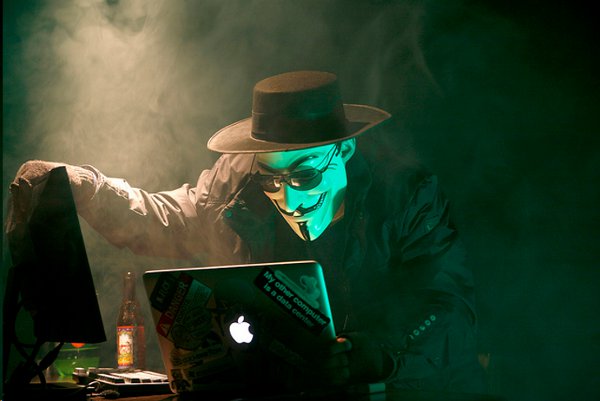Welcome to the World of (Not So) Anonymous Hackers

Jonathon James. Kevin Mitnick. Albert Gonzalez. Kevin Poulsen. Do these names ring a bell?
They are some of the most infamous criminal hackers in the history of the United States. Their stunts ranged from infiltrating NASA to intruding on the FBI network and retrieving confidential wiretaps to committing identity theft amounting to over $4 million in stolen credit cards.
These men were elevated to “most wanted” status because of the caliber of their crimes; carried out endeavors that Hollywood loves to sensationalize and mystify. So why is that no one is impressed?
Perhaps it's because in a world where D.O.S (Denial of Service) attacks, R.A.T (Remote Administration Tools) hacks, mail bombs, and cyber espionage to governments and corporations are commonplace, their names could be easily substituted for any one of the thousands of black hat hackers that work in anonymity; plus, the thousands of white hats in the burgeoning cybersecurity industry that have emerged to stop them.
Yes, nowadays “hacking” does provoke a portentous chill down our backs because of the state of vulnerability that such an intrusion puts us into, but Steven Levy, author of the 1984 book Hackers: Heroes of the Computer Revolution has a more decorous recollection.
“As I researched them [hackers], I found that their playfulness, as well as their blithe disregard for what others said was impossible, led to the breakthroughs that would define the computing experience for millions of people,” said the author in a 2010 issue of Wired magazine.
He describes an age when hacking was really about writing up computer programs for enjoyment. In fact, Levy reviews how these early hackers were innovators in the computer science industry, developing many applications ranging from word processing to the first digital videogames.
What Levy found “marvelous” was that all hackers shared a set of values including decentralization, being judged by their work and not their education or background, and most importantly – all information should be free.
Freedom is an umbrella whose canopy covers a myriad of issues including copyright, Internet accessibility, government censorship, intermediary liability, just to name a few. As a reaction to these issues, hackers have become more involved; use their moxie, on and off the screen, to make their political point.
“We are legion. We do not forgive. We do not forget. Expect us.”
“I would love to live in a country where the government fears its people, and not the other way around,” said Anonyops in the BBC documentary How Hackers Changed the World: We are Legion.

With a memorable tagline, a vast media presence, and an identifiable brand name and logo (a suit without a head, and if ever in public—a Guy Fawkes mask), Anonymous was named in 2012 one of Time’s 100 Most Influential People.
Its method of procedure involves “trolling”, or bullying, Web page defacement, threatening emails, leaking confidential information, and a plethora of other tactics that stem from one objective—to battle what it deems unjust or evil through unity and elaborate pranks.
“They are the rude boys of activism; there’s a real rough edge to them....they represent chaotic freedom,” said Gabriella Coleman, an anthropologist and expert on hackers and digital activism, who was interviewed for the BBC documentary.
This online collective launched itself onto the world stage in 2008 when it declared the Church of Scientology public enemy number one by initiating the Chanology Project to publicize a Tom Cruise video on Scientology, and organized massive prank calls and protests in cities across the U.S., Australia and Asia.
From there it got its taste for political activism and went on to pursue other public figures.
Anonymous has gone after the FBI, CIA, dictators, religious institutions, and banks; all the while, supporting movements like Occupy in 2012, or opposition groups in Syria during its most recent Internet blackout and aiding them via phone calls to get their routers up and running, according to Anonnews.org, a news site that the group launched this year after raising over 50 thousand dollars.
It has bullied neo-nazi radio personalities, like Hal Turner, gay-bashing communities, like the Westboro Baptist Church, along with culprits involved in the rape and subsequent cyber bullying of Rehtaeh Parsons, a 17-year-old from Nova Scotia.
The most recent case was of the L.A. Times and Matthew Keys, the deputy social media editor for Reuters, and faces federal charges for conspiring with Anonymous to breach the website of the Tribune Co. newspaper. They changed the title of a tax-cut related story to read: “Pressure builds in House to elect CHIPPY 137.” It was only a prank according to Jay Leiderman, Keys’ criminal defense attorney. A prank that cost the Tribune Co. $5,000 to restore its systems, after Keys allegedly provided Anonymous access to the company’s servers, according to the L.A. Times.
However, the dexterity with which a hacker can infiltrate a desktop, smart phone, tablet, laptop or any other device with a microchip to threaten, publicly humiliate, steal or alter personal information, or ruin your business implies a baleful power.

“No one in the general public really seems to get it…the ability for Anonymous to be everything and anything is its power,” stated Gregg Housh, and Internet activist associated with the group.
So while Anonymous seems to walk a fine line between the ethical and unethical, the rest of us are ineluctably called to perform a reality check on the potential dangers lurking in the digital world, both on a personal level and a corporate level.
"There are two types of people: those who've been hacked and those who don't know they've been hacked," said former Homeland Security Secretary Michael Chertoff to NBCNews.com.
In 2011, for example, threat researchers at McAfee initiated an investigation that uncovered acts of cyber espionage on 70 global companies, governments, and nonprofit organizations over the last five years. Operation Shady Rat was intent on collecting intellectual property and trade secrets, or what vice president Dmitri Alperovitch calls a “transfer of wealth”, including guarded national secrets, email archives, negotiation plans, exploration details for gas and oil fields, legal contracts, design schematics, and whatever else glimmers.
In a threat report, the VP of McAfee’s threat department states that political hacktivist groups like Anonymous are “unsophisticated” and expresses more concern on what he defines as “advanced persistent threats.”
A sentiment shared by the U.S government after receiving a threat in early May from the group, using the Huffington Post as its messenger. The warning read: "Anonymous will make sure that this May 7th will be a day to remember.” Its latest threat is against the U.S. government in retaliation for war crimes committed in the Middle East. The focus of their attacks will be websites of the White House, Pentagon, FBI, arch enemy Bank of America, and Chase.
Although preventive measures were taken against cyber attacks, officials have told the Huffington Post that it is prepared and expecting “limited disruptions” and “nuisance-level attacks against publicly accessible Web pages."
In its ongoing world war for Internet freedom, such acts have earned Anonymous the label of cyberterrorists. Yet, despite controversy, the collective is rising in popularity because it welcomes the computer geeks and the technophobes alike. Anyone can get involved whether it’s online or in the streets. Any pocket of hactivists from around the world can borrow the Anonymous banner.
Author Bio:
Yolian Cerquera is a contributing writer at Highbrow Magazine.
Photos: Juan Gulao; Dustball (Flckr, Creative Commons).






























































































































































































































































































































